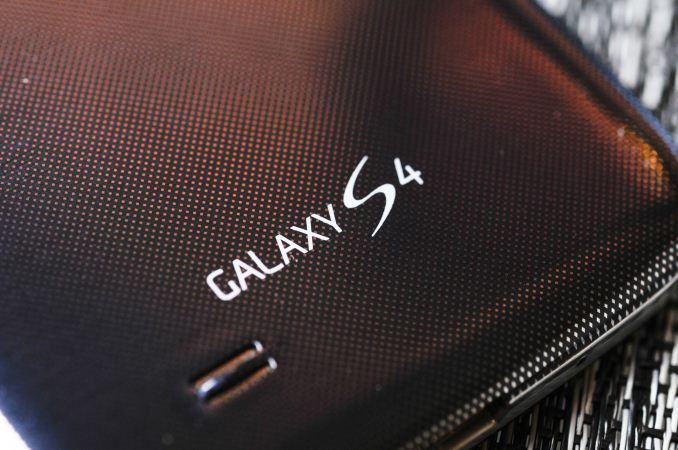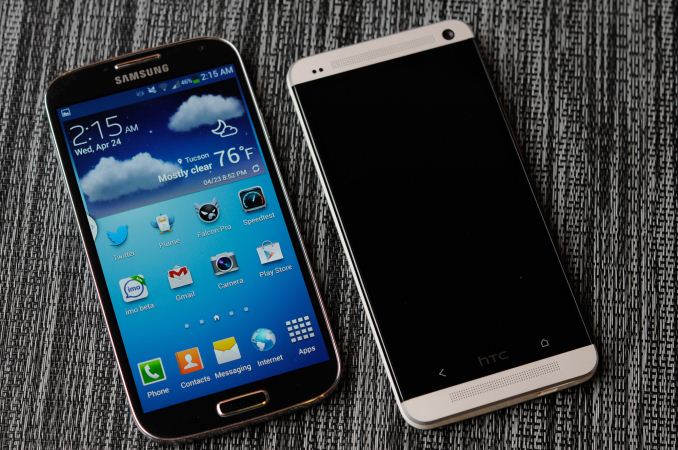Samsung Galaxy S 4 Review - Part 1
by Brian Klug on April 24, 2013 12:01 AM ESTFinal Words
Samsung has done a tremendous job creating a global following not only for its brand, but also for its software. In studying Samsung and its devices it becomes quite clear that although many enthusiasts yearn for pure, unadulterated Android, there are seemingly big pockets of the market who have grown used to (and maybe even desire?) Samsung's TouchWiz user experience. It really is a very clever strategy on Samsung's part. If you deliver products that your users appreciate, and deliver a uniquely different user interface at the same time, you begin to create an appreciation for that user interface as well. All of this flies in the face of what we as reviewers normally seem to prefer, but Samsung's success is proof of the fact that not everyone absolutely detests OEM customized Android.
Samsung's existing user base is likely the easiest to talk to about the Galaxy S 4. Compared to any previous Galaxy S device, the SGS4 is a clear step forward in all of the right areas. The display is higher resolution, the SoC is significantly faster, there's better WiFi (and connectivity depending on what generation of Galaxy S you're talking about) and obviously the Galaxy S 4 runs the absolute latest version of Android. Even on the camera side, Samsung has improved imaging performance over the Galaxy S 3 this generation thanks to its use of a wider aperture lens system. If you're a happy owner of a Samsung Galaxy S/S2/S3, you'll likely be a happy owner of a Galaxy S 4.
It's when you compare the Galaxy S 4 to its chief technical competitor, the HTC One, that the discussion becomes more complicated. HTC and Samsung take very different approaches to nearly every aspect of their flagship smartphones. Whether it's display (LCD vs. Super AMOLED), camera (low light vs. well lit performance), or software (subtle Sense 5 or feature filled TouchWiz), you couldn't pick two more different players in the Android space. So which is better?
It really depends on what you value more. The One's camera delivers better low light performance, while the Galaxy S 4's camera delivers better performance in well lit (e.g. outdoor) scenarios. The One's software customizations are definitely more subtle and out of your way, while Samsung's approach is much more feature overload and in your face. It's difficult to say for sure given our Sprint review unit, but HTC likely gets the slight edge in battery life based on our results here today (although these two devices can be close competitors depending on the workload). Samsung does integrate the faster SoC, despite both the Galaxy S 4 and HTC One shipping the same Snapdragon 600 platform. Samsung and HTC remain on opposite sides of the removable battery/microSD fence, if those two things matter to you then Samsung is the obvious choice. Finally there's a question of how much you value/desire an all-metal smartphone. For some, Samsung's choice in materials is going to continue to be a very big issue.
At the end of the day, the Galaxy S 4 is an evolution of the Galaxy S 3 in pretty much all of the areas you'd expect it to be. Whether or not that's what you wanted in a new Android smartphone is going to vary from one person to the next. The good news is that you at least have a choice.












335 Comments
View All Comments
tarun.chatwith - Wednesday, April 24, 2013 - link
HTC One without a doubt.Enough of plastic
FITCamaro - Wednesday, April 24, 2013 - link
You're just going to wrap it in a plastic/rubber case anyway most likely. So to me it's not much of an issue. I just got a new phone at work and went with the Note 2. Loving it so far. A tad large but I have big hands anyway and can text with holding it in one hand so I'm good.UpSpin - Wednesday, April 24, 2013 - link
Don't generalize. I never used a plastic/rubber case or a screen protector, only used a sleeve/bag to protect and clean the display while in the my pocket. You might enjoy plastic, others enjoy aluminum. Both materials have their advantages and disadvantage, in the end it's a personal decision. However aluminum looks and feels more expensive and looks of higher quality, and considering the price you pay for such a smartphone, it's understandable that people want that the device looks the way it costs.danbob999 - Wednesday, April 24, 2013 - link
It's a phone. Why would you care how expensive it looks?DigitalFreak - Wednesday, April 24, 2013 - link
VanityThud2 - Thursday, April 25, 2013 - link
The vanity of trying not to appear vain.darwinosx - Wednesday, April 24, 2013 - link
Because when you pay money for something you want it to look and feel good. Obviously.Notmyusualid - Wednesday, April 24, 2013 - link
+1danbob999 - Wednesday, April 24, 2013 - link
Even if it means being larger, heavier, with a smaller display, a smaller battery, and no more resistant?UpSpin - Wednesday, April 24, 2013 - link
But this isn't the case here. It has a larger bezel because of dual front speakers which are obviously better than mono back speakers. As long as it's comfortably weighted, heavier doesn't mean worse. (see complaints about too light iPhone). The display is smaller, but the size is a personal decision. The battery life is identical or even better, not worse. The shiny plastic gets easier dirty, is softer and easier to scratch than the anodized aluminum, it's also easier to break thin parts of the frame and thus buttons than to break a unibody case. But alumium is easier to dent.